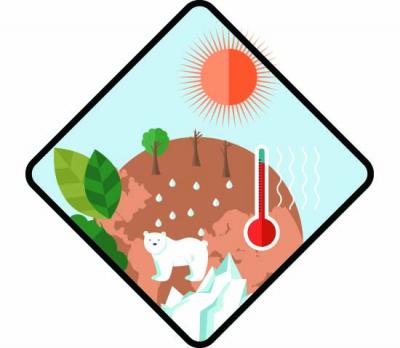Climate Change
Climate change presents a significant challenge for communities and urban systems worldwide. Climate change impacts such as increased rainfall intensity, storm surges, flooding, and urban heat island effects are affecting communities worldwide. The effects of a disrupted climate will likely intensify over the coming decades.
How do we adapt to a changing climate? How can we curb our emissions?

Climate Action Committee (CAC)
Created in January 2008, the CAC’s principal role is to advise the City and County on strategies to implement the Climate Action Plan with a specific focus on greenhouse gas emissions, preparing for climate impacts, monitoring progress, and conducting community outreach.
Visit the committee’s webpage for upcoming meetings and related documents.
Transportation Strategies to Reduce Greenhouse Gas Emissions
Over the past several years, the CAC has performed greenhouse gas emission modeling to project the impacts of Jefferson County. The modeling has helped organizations, governments and residents of Jefferson County take steps to reduce our greenhouse gas emissions and accrue a number of related benefits in doing so. The number one source of greenhouse gas emissions – and the fastest rising source – is from transportation. Our region faces a common challenge of increasing reliance on the automobile as more of our workforce is forced to live further from urban centers due to housing availability and affordability. Reducing the growth of emissions from transportation sources is the area where we can make the largest impact. The CAC developed two working groups to focus on 1) reducing vehicle miles traveled and 2) electrifying our transportation system through electric vehicle conversion.

North Olympic Development Council
The City of Port Townsend is a member of the NODC. The NODC empowers the North Olympic Peninsula to invest in and pursue its own economic and environmental destiny. As the federally-designated Economic Development District for Jefferson and Clallam counties, NODC is a collaborative, innovative effort among member governments, community organizations, tribes and businesses to advance economic, environmental and quality of life initiatives in the region. NODC primarily plays a planning and facilitation role, collaborating with local governments, nonprofit organizations and businesses to improve the regional economy. One of the current areas of focus with the City is around regional climate priorities.
Regional Climate Priorities
The Olympic Peninsula relies on key industries such as marine trades, tourism, agriculture, timber, and fishing. Climate change impacts all of those industries as well as the quality of life and the values our residents place on the natural environment. Given this level of impact, the North Olympic Development Council (NODC) is focusing on working with local governments to prioritize regional climate change strategies. Topics include but are not limited to food resilience, wildfire, water supply, sea level rise inundation, shoreline erosion/protection, water quality, marine health, transportation, and many more areas that have the potential or are already adversely impacting the North Olympic Peninsula. The City of Port Townsend is actively involved in these efforts. For more information, visit the NODC web page.
Climate Impact Asset Inventory
In partnership with the CAC, the City is taking advantage of a small grant opportunity through the North Olympic Development Council (NODC) to further the understanding of sea level rise impacts on Port Townsend. Building upon the 2015 Climate Change Preparedness Plan for the North Olympic Peninsula report, the NODC is facilitating an asset inventory and identifying relative risk factors to impacts from sea level rise. This asset inventory will help the City prioritize critical public infrastructure requiring protection or mitigation from the effects of sea level rise. The asset inventory is an important step leading to development of sea level rise mitigation strategies.
Sea Level Rise Risk Assessment
Through a grant secured by the NODC, The City of Port Townsend Sea Level Rise and Coastal Flooding Risk Assessment was developed to help the City understand how the impacts of Sea Level Rise (SLR) impacts critical infrastructure. The assessment evaluated infrastructure life cycle against the rise of flooding due to SLR. The report also provided an in-depth analysis to quantify wave runup and the relationship of storm surge compounded by SLR.

City of Port Townsend 2021 Shoreline Master Program Periodic Review
Port Townsend is a city of and on the water. Buildings in the downtown, historic, landmark district harken back to the city’s founding as a Victorian seaport. Today, two bustling marinas buoy the economy while residents and tourists enjoy miles of sandy beaches. Climate impacts like sea-level rise and more intense storm surges are and will impact our shorelines. To help the city prepare for these impacts, a new policy is proposed as part of the City’s (required) Shoreline Master Program periodic review.

Marine Resources Committee
The Jefferson County Marine Resources Committee (MRC) consists of resident volunteers committed to protecting and restoring marine habitats. The City partners MRC to consider current and future projects and initiatives. One locally visible example is a collaboration (including with WSU Extension) to install rain gardens, which help mitigate climate impacts. For photos and additional information visit the MRC website.

Local 2020
Local 2020 is a non-profit striving for local sustainability and resilience. This grass-roots organization has formed “action groups” focused on a variety of topics including Climate Change. Local 2020 actively engages the community through educational forums, Taming Big Foot contests, etc. If you are interested in reducing your carbon footprint or learning how to prepare for climate change, check out the resources on their website.
In addition to their education and outreach efforts, Local 2020 has partnered with Jefferson County and the City of Port Townsend Climate Action Committee to track the communities progress toward reducing emissions (Emission inventory reports 2009 and 2020).

